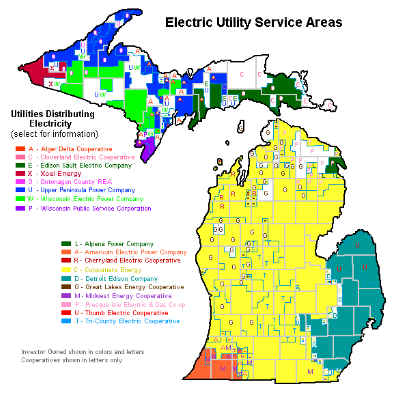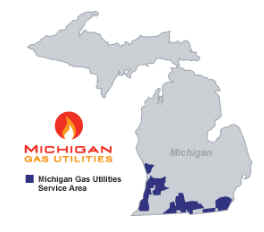![]()
Questions?
Contact 303-322-1234
![]() Follow
the ORANGE
links for our recommendations.
Follow
the ORANGE
links for our recommendations.
![]()
![]()
Residential Electricity:
Unfortunately, at this time we are NOT able to help residential electricity customers find competitive pricing on electricity in the state of Michigan.
Commercial Electricity:
Unfortunately,
at this time we are NOT able
to help commercial electricity customers find competitive pricing on
electricity in the state of Michigan.
HOWEVER their is opportunity for Energy Consultants in Michigan.
For details
read the information provided HERE.



Michigan
Electric:
Michigan, which for years allowed all customers to shop for an
alternative electricity supplier, made several changes in 2008 to
limit the amount of customers who can buy their electricity supply
from a company other than the utilities.
Under Michigan's new law, only 10% of the electric sales in a
utility's service area can be sold by an alternative electric
supplier. This means if you're interested in saving money on your
electric bill by buying from a competitor, the opportunity may not
be available if too many other people have shopped for electricity
from an alternative provider. If you're interested in shopping for
a cheaper electric rate, or to get a customized product such as
green energy, now is the time to do so, before the 10% cap is
reached. Utilities will soon be building new, expensive power
plants that their customers will have to pay for, and greater
interest in buying supply from a competitor is expected as prices
increase.
When you buy electricity from an alternative provider, you are
buying the supply, or commodity, portion of your bill. Your local
utility will still handle delivery of this supply to your home or
business, and you will still pay them for these delivery services.
Customers who either choose to remain with the utility, or who are
denied the opportunity to leave, are served on default supply
service. While the cost of default service typically changes only
once a year, it is subject to various "true-ups," or
adjustments for previous years. For example, utilities often defer
many supply expenses, then collect them in later years, hitting
customers with higher costs than they expected when they initially
consumed their power.
Natural Gas:
The Michigan Public Service Commission has reformed the natural
gas industry to give customers a chance to shop for lower natural
gas rates. Starting at different points around 2001-2002, Michigan
Consolidated Gas (MichCon), Consumers Energy, Michigan Gas
Utilities and SEMCO Energy Gas Company opened their service areas
to allow customers to choose a different company to supply them
with their gas supply. Customers choosing an alternate gas
supplier will still have their gas supply delivered by the local
utility, but customers will be buying their gas supply from a new
company.
A customer's natural gas bill has been separated into two parts:
Regulated distribution of gas, which is still only provided by the
utility, and
Supply of the gas commodity, which is open to competition.
Customers can choose to receive their gas supply from their
utility, or an alternate gas provider. If customers do not
shop for an alternate gas supplier, they receive default supply
service from their utility. Under default supply service,
customers pay a supply charge known as the Gas Cost Recovery (GCR)
charge, which compensates the utility for arranging for the
customer's supply. The Gas Cost Recovery can change monthly,
meaning customers can be exposed to volatile swings in monthly
prices. Customers can avoid wild swings in the gas supply charge
by contracting with an alternative gas supplier.
No matter who you choose to buy energy from, your local utility
will continue to deliver your gas and respond to service
interruptions and outages. You will still pay your utility for
these services. Depending on your area, you can choose to receive
a single bill from your utility listing your utility delivery
charges and supplier commodity charges, or separate bills from the
utility and alternate energy provider.
http://www.dleg.state.mi.us/mpsc/gas/servarea.htm
Residential Natural Gas:
We can assist residential natural gas customers in Michigan obtain competitive price quotes to help lower their energy costs.
Consumer's
Energy Company
(CEC)
MXenergy
- 61.9¢ / Therm
Commercial
Natural Gas:
We can assist commercial natural gas customers in Michigan obtain competitive price quotes to help lower their energy costs. Simply fax an LOA and your entire natural gas bill to 303-200-8670 for a competitive price quote to see if we can help you save money on natural gas. Contact us directly at 303-322-1234 if you have any questions.
Consumer's
Energy
CLICK
HERE For a Custom Price Quote
DTE
Energy / Michigan Consolidated
CLICK
HERE For a Custom Price Quote
Michigan
Natural Gas Utilities:
| Aurora Gas Co. | |
| Citizens Gas Fuel Co. | |
| Consumers Energy Co. | |
| Michigan Consolidated Gas Co. | |
| Presque Isle Electric and Gas Coop Inc. | |
| SEMCO Energy Gas Co. | |
| Superior Energy Co. |

If you would like to inquire about our business opportunities in
Michigan, please contact us directly at 303-322-1234
or visit our Opportunity
page.
|
|


